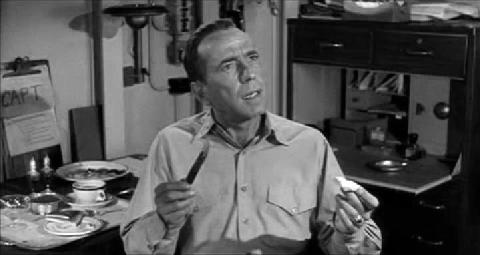Captain Queeg in The Caine Mutiny--now there was some serious crazy. And nothing that Queeg does in the book, or the movie, says "crazy" quite like the hunt for the missing strawberries. After noticing that the ship's strawberry ration is a quart low, Queeg (played admirably by Humphrey Bogart in the 1954 movie) turns the ship upside down looking for them. When the kitchen mates admit to eating the strawberries, Queeg ignores them and forges ahead. We later discover that Queeg had been reenacting an earlier moment of glory when, as a young officer, he solved a shipboard crime and earned a special commendation.
Queeg's form of insanity is quite common. Faced with a hostile and unfamiliar environment, the new captain does something that worked well in the past. When it becomes clear that the present situation is nothing like the past one, he doubles down and tries to force the facts that he has to fit into the narrative that he knows. This is a normal thought process gone bad for want of an “off” button. The ability to think by creating analogies makes us human. The inability to recognize the limitations of those analogies makes us insane. Over the last three weeks or so, our Congress has become quite insane.
The crimes that Congress solved back in the day were the Watergate break-in and the complicated web of government corruption that accompanied it. The Congressional Watergate hearings were indeed the glory days of the American Congress. The members of the bipartisan committee appointed to investigate the break-in took the job seriously. They uncovered genuine abuses of power at the highest levels of government, and they forced a president to resign. The whole Congressional oversight thing worked.
Ever since 1974, Congress has been trying to do it all again. The "-gate" suffix has become the universal indicator of government scandal. Jimmy Carter has his "BIllygate," when his brother signed on as a paid lobbyist for the Libyan government. Ronald Reagan spent much of his second term battling "Iran-Contragate" investigations in the Senate. Bill Clinton, of course, had both "White Watergate" and "Monicagate." And George W. Bush saw "Scooter Libbygate" strike perilously close to is inner circle.
Each of these scandals came with all of the strum und drang of post-Watergate political morality, but none of them felled a president. None of them did much good for the party out of power, and none of them created the kind of bi-partisan national consensus of wrongdoing that brought Nixon down. They were all, more or less, quarts of strawberries.
The original narrative has been on full display this spring. Three different “scandals” have now been pronounced worse than, or at least as bad as, Watergate. One of these -gates involves the administration's first public statements after terrorists killed four Americans in a foreign country. One involves some clearly illegal regulatory harassment at a fairly low level in the IRS. And one of them involves the subpoena of documents by the federal agency responsible for subpoenaing things like documents.
These are not non-issues. They are all things of legitimate concern, both to Congress and to the American people. It would be derelict of Congress not to look into them. The Federal government is a huge enterprise with hundreds of thousands of employees, and Congressional oversight of the executive branch is vital to quality control.
But we deserve investigations of the incidents themselves. We need to understand them on their own terms, with their own logic, as things that went wrong in the recent past and could be improved in the near future. This means that we need honest inquiries by competent investigators, which is virtually impossible when Congress assumes that every bad thing that happens in the executive branch will have the same narrative arc as the Watergate scandal. Honest investigations are not possible, it turns out, when both sides are simply trying to score political points and come out looking slightly less repulsive than the other guys.
Nothing has come to light yet that suggests anything like the political corruption we saw in Watergate. But then, it took two years for Watergate to unfold. And this appears to be the narrative that is guiding the current investigations. When the Senate Minority Leader says that the IRS scandal is simply “the tip of the iceberg,” what he is really doing is invoking the Watergate narrative and assuring us that, if Congress just spends enough time investigating things, they will eventually find a "smoking gun" that, like Nixon's self-incriminating tapes, provide clear and irrefutable evidence of corruption at the highest levels of government.
And that is precisely how you chase a quart of strawberries.
